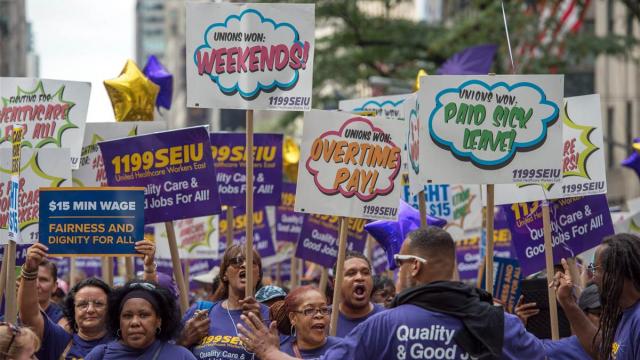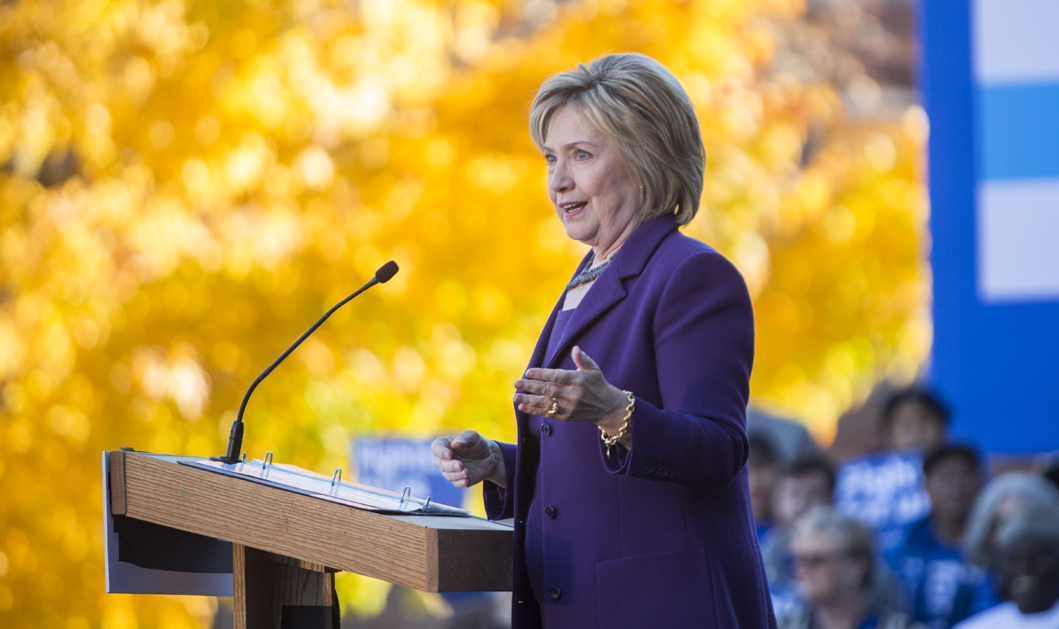
Hillary Clinton's latest union endorsement — this time, from the 2.1 million member Service Employees International Union (SEIU) — has, once again, been an example of union leadership prioritizing political connections in high places over the best interests of its members.
As In These Times reported, the SEIU endorsement has angered local chapters so much that they're breaking off from the main union and endorsing Bernie Sanders, as they already have in New Hampshire, the first official presidential primary state. Rank-and-file dues-paying members of the SEIU said the executive board's announcement came too early, and point out that while Clinton's proposal for a $12 an hour minimum wage flies in the face of the SEIU's own Fight For $15 campaign. Both of Clinton's opponents in the Democratic primary, Bernie Sanders and Martin O'Malley, have gotten behind the call for a $15 an hour minimum wage.
The SEIU's Facebook page has been full of angry rants from dues-paying members upset with the endorsement. Daily Kos collected some of the more descriptive posts from the page's wall:
“Please retract the SEIU endorsement for Hillary Clinton. She does NOT represent the average working American. She takes funding from Wall Street PLUS foreign donations as well as contributions from Private Prison Corporations. So just exactly who does she work for?" Wrote Cathy Bosell Haye.
“This is scandalous, shameful, counterintuitive, problematic, defeating, and divisive. Pathetic," wrote Angel Rodriguez. "SEIU's biggest national campaign is the Fight for $15 and a union. Across the country, we are organizing workers to strike and demand a $15 minimum wage. DESPITE THIS: Hillary Clinton is on public record as opposing a federal minimum wage of $15 per hour.’’
So if the SEIU's endorsement wasn't due to Clinton's progressive values, why did they endorse her?
Other unions that have endorsed Clinton's 2016 campaign paint a clearer picture. The Association of Federal, State, County, and Municipal Employees (AFSCME) also endorsed Clinton earlier. As Huffington Post reported, AFSCME was largely responsible for the rise of Bill Clinton in 1992, and endorsed Clinton in 2007 during her last attempt at the Democratic nomination. And just as it happened with the SEIU endorsement, AFSCME members revolted at the national leadership's decision to endorse Clinton, saying an endorsement this early only served to divide members, and that union leadership should instead focus on issues that unite the union's members.
Clinton's first union endorsement came from the American Federation of Teachers (AFT), which represents public K-12 teachers as well as college-level instructors. As with SEIU and AFSCME, AFT members resisted the leadership's endorsement of Clinton, as it only served to stifle debate that is essential to the Democratic process. A petition circulated by AFT members calling for national leadership to pull back their endorsement of Clinton has garnered over 5,500 signatures as of the time of this writing.
As CounterPunch pointed out in this article, unions have steadily been declining as labor leaders continue to implore members to trust "friendly" parties rather than try to make the unions a political force in and of themselves. Curiously, over the past 60 years, union membership has declined at the same time as wages have stagnated or dropped. In 2012 research from the Economic Policy Institute's research found that the share of the workforce that had union representation dropped from 26 percent to 13 percent between 1973 and 2011. That time period covers 3 Democratic administrations, and 4 Republican administrations. Regardless of the party in power, union membership and wages continued to decline.
The numbers bear out — labor unions' longtime ties to establishment Democratic politicians hasn't won them more membership, and hasn't grown the middle class. On the contrary, both parties have overseen large gains in wealth for the top 1 percent of Americans, and the simultaneous evaporation of the middle class. If labor unions really want to hold power again, they should focus instead on pushing members of both parties to support their goals, rather than aligning with politicians to have a seat at the table of power. The future of organized labor may depend on it.
3 WAYS TO SHOW YOUR SUPPORT
- Log in to post comments
















